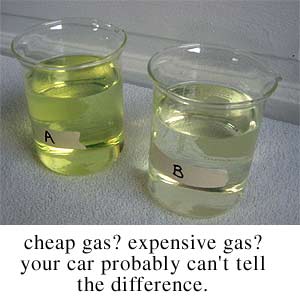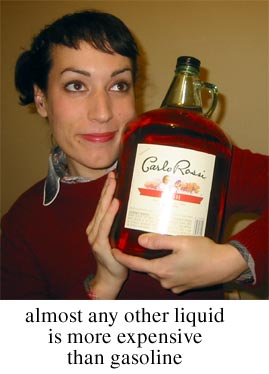

 |
 |


There are different brands of gasoline, and different formulations, but they all make your car go. In my opinion, it doesn't make any difference which gasoline you use, they are all pretty much the same. If you've never tried cheap gas before, now is the perfect time! Cast a vote for cheaper gas by buying the cheapest gas you can find. I know your car's engine is valuable. If you have problems with the gasoline from a station in Sacramento, please contact me immediately. |
|
|

Gas stations could mix something else into the underground gas tanks, but what? Lighter fluid? Olive oil? Nearly every liquid on earth costs more than gasoline. It wouldn't make sense. |
Brand Name
|
|
The photograph on the right shows two beakers of gasoline. One is filled with $2.05 gas from Poplar Food & Liquor in West Sacramento (Sacramento Gas Station #031). The other is "premium" $2.35 gas from Unocal 76 on X Street. Before I filled these containers, I didn't even know what color the gas would be. One is a little bit yellow, the other is very clear. I don't think your car can tell the difference. I realize that high-priced stations have their own credit-cards, wet squeegees, cleaner mini-marts and unlocked bathrooms. Please join me in forgoing these luxuries for a few months while we chip down the gas prices around town. |
|
| As for the crude oil, I found this information at discover.com:
A typical fuel refinery will obtain 19 gallons of gasoline from each 42 gallon barrel of crude. The amount of other products obtained from crude oil depends on the same factors. In addition to gasoline, crude petroleum is used to make petroleum gases (methane, propane), solvents (naphtha, toluene, etc.), fuel oils (diesel, home heating oil), lubricating oils (motor oil), specialty lubricating oils (baby oil), petrolatums (Vaseline), waxes (candle wax), asphalt (road paving). Everything in a barrel of oil is used; nothing goes to waste. |
| The price of gasoline and crude oil are definitely
connected, but there is flexibility in the connection.
On March 20, 2003, you could buy wholesale gasoline at 93 cents a gallon and oil (light, sweet crude) at $29.36 a barrel (for delivery in the future). Wholesale unleaded gasoline for delivery in May was 93.35 cents a gallon at the close of trading Wednesday in New York, down from the recent high of $1.16 on March 10, according to Beutel's records. West Texas Intermediate, also known as light, sweet crude, was $29.36 a barrel for delivery in May. source: USA Today |
|
Some more miscellaneous gasoline information: The USA uses 9 million barrels of oil per day for transportation (ABC news television) A gallon of gas contains about 60 kilowatt-hours of chemical energy (only about 25% of the chemical energy can be turned into mechanical power, and the rest is wasted as heat). This is an awesome amount of energy packed into this small package. Compare the energy density of gasoline (14.0 Kilowatt-hours per kilogram) to the energy density of Lithium Ion batteries (.16 Kilowatt-hours per kilogram). source: University of Oregon
|
More information about Sacramento Gas
Connoisseurs:
This page last updated May 1st, 2003 | Copyright © 2003 Rob Cockerham | |
How Much is Inside? | Incredible Stuff | Science Club | about Cockeyed